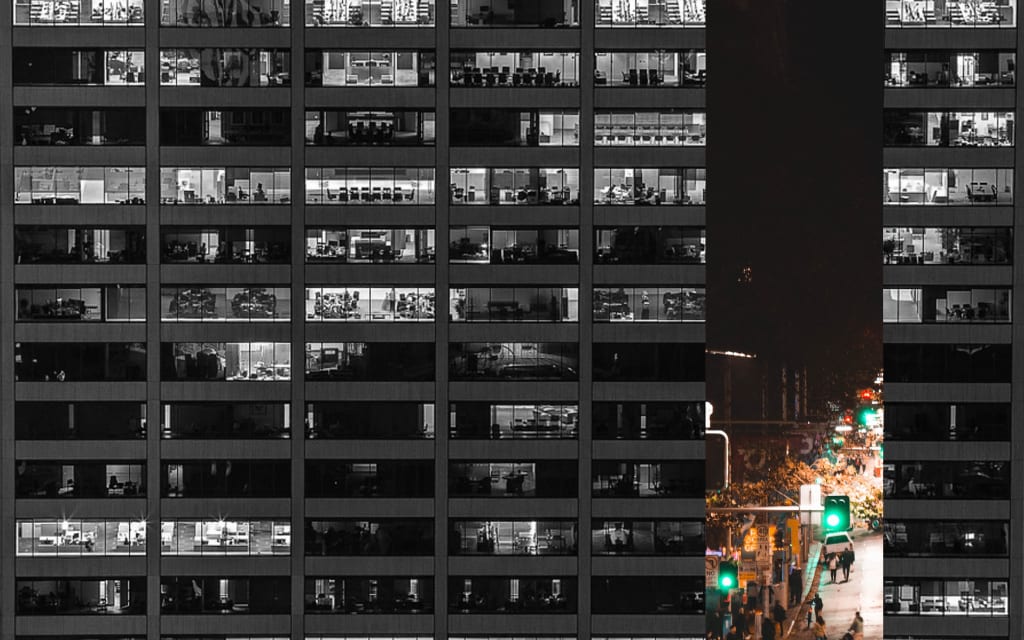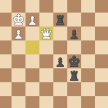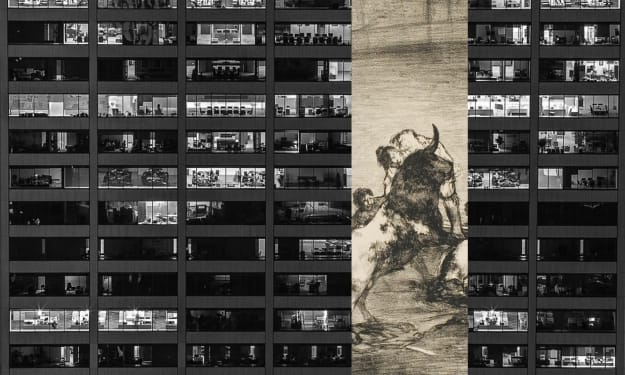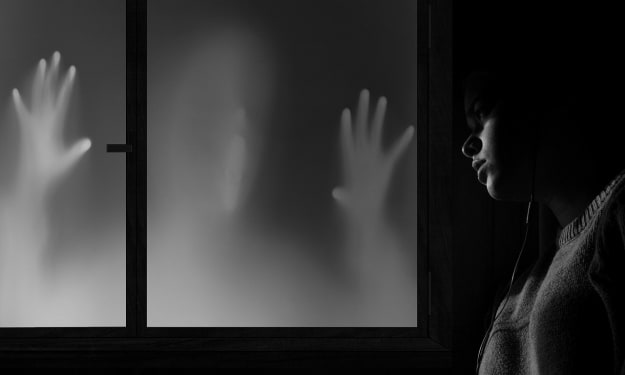
The privacy of a cubicle might actually be preferable. To allow for some semblance of reflection during this tired part of the day, that middle third that sits between fat slices of feigned productivity. Work happens in part because someone else watches you do it. It is not unlike dancing this way, and so maybe this dance comes in three movements. When you eat lunch at your desk and look out the windows at the river that flows into the lake whose center is sixty miles away, your laptop is still open, you are receptive to the rituals and etiquette of work, and so this liminal space becomes the setting for a crucial, quiet sequel in the trilogy.
Sometimes during part two he would walk outside among the other skyscrapers. Today he took lunch at his desk, chewing on metaphors and nicotine gum. Curiously, it turned out that the best way to hide a mild drug habit was simply to never speak of it. To the tourists fresh off of the architecture boat tour down by the water he had become necessarily invisible, but he could still watch them exit the boat languidly while he waited for the small difference of the stimulant. Vacation happens in part because someone else watches you do it. Outside it was still overcast.
Instead of eating he thought about people who had never lived alone. Living alone gave access to a certain solitude that was woefully addicting, that had come to feel imperative in a way he found hard to articulate. Ample space for reflection, meditation, sure. But there was also a generative lack that they could not know about. A reprieve: from that mass suspension of disbelief that becomes almost second nature when working, vacationing, living around everyone else—the mere possibility of being observed, interrupted, woken up, walked in on, didn’t this tend to tweak the personality in real time, and wouldn’t years of that adjustment occurring again and again itself alter the greater trajectory? The disbelief being in re: to the value of predetermined responses to the action or presence of others; its suspension being the collective placement of value and faith in these rituals regardless. A series of emails continued to flit into his inbox like dealt playing cards.
Apparently the trick to memorizing a deck of cards was visualization, and one version of this trick was to picture yourself walking through a kind of house. As you walk through it in your mind, you mark the things you touch with the next card in the pile, creating a linked chain of moments and their associations through which you can move again.
Though he’d pressed her for psilocybin, his therapist had opted for a similar exercise. Asked him to think of his mind like a physical place, with rooms of all sorts, each dedicated to a certain function. To imagine himself walking through it, picking things up, sitting down in certain nooks, closing and opening the window shades. The infinite ways his vision could frame any moment there, with the light and clutter of a unique day. What kinds of rooms does he see? Early on he’d often thought to stumble into a meditation room, a sparse dry space with low lighting and patterned carpet. A place to think.
The trouble with an open office plan is the way it looks when everyone else is out to lunch. Once prisons and asylums exist someone has to live there. Was that Checkov? At first, he’d found the rooms did not remain fixed unless he intentionally added the lack of someone else. The space could not be used therapeutically because it was unreliable, but by including the notion that someone who had already spent time there was now gone, they’d changed the space together even if only by having once walked through it. A second problem was that this introduced into a simple spatial exercise the idea of externality—where were they off to?—and so what had started as a way to compartmentalize the various disappointments and habits of his life into a bounded space had become solipsism turned inside out: sprawling mental walks through an increasingly large apartment building, then a series of gardens, its surrounding neighborhood, eventually, a small district of some mental remix of the city he watched below him at his desk while chewing gum. The emails concerned a request, already delegated several times over, for a client report he’d handled to be redacted so that it could be sent to a different client, privacy intact, NDA upheld.
Instead of responding to these messages he considered the way the walls of the city created manifold infrastructural issues, the benefits of traffic circles and the erasure of vehicles altogether, residential apartment buildings, parkways, varieties of stoplights. He did not yet want to deal with that third issue: of other people, the complexities their infinite routines introduced. Better to create a space for ideas to arrive than to force the invite. The appeal of the exercise, his therapist had told him, is that it gives you a place to store things. The appeal of the exercise, he had told himself while looking at the patterned carpet, is that it gives you a place. Out the window and down by the river, tourism continued in accordance to a strict rhythm: off the boats, onto the sidewalks or into the buses or cars, and funneled into left, right, center lanes of traffic snaking off to other places, other things to see.
Stoplights are typically timed switches that put these things on hold exclusively so that other things might pass through the same space. Stoplights are sometimes activated by pressurized plates buried in intersections, waiting for whatever’s heavy enough to arrive and take trafficked precedence. Stoplights are perhaps also there to serve an abstract purpose, preventing an otherwise continuous flow of urban life, whose truncated and incremental progress is crucial to upholding an idea everyone decided to share about our own trajectories and their destinations—that the busiest and best of us all cluster together in this metal mass of exceptional inconvenience, keeping these empty buildings brightly lit so that the idea of life inside them persists enough to pull someone else to move there, work there, live there long enough to keep the lights on in a single window that nobody else will ever enter, with neatly stacked rows of rooms like this rising up to form part of a place that they will all orbit without ever touching, a place that, strictly speaking, does not actually exist. He liked to walk late at night when there were no cars around, find a long stretch of midwestern horizon flat enough to contain miles of picketed steel intersections. The dotted wave of green light would leave yellows and reds behind it as it ushered nothing at all past this gravitational center and to the ends of his vision.
The several ironies of the task now at hand was that the sum of time it had taken several people to each offhandedly delegate it via email during their lunch break was already greater than the time it would take him to do it; that he had already done it months ago for one of them, and that person had now forgotten that he already possessed somewhere on his computer the file that was being requested again; that he would not tell any of them that he had already done it, months ago, and instead calculate how much time it would take to actually do it, then send it slightly before the end of that interval; that by lifting the performance rather than weight of the workday continuously like this he had come to be viewed as competent and reliable; that even if he had taken twice as long as the interval he calculated he would still be viewed this way, because the flow of work required everyone to feel involved in order for the traffic of the workday to retain any sense, lest one of them realize he was sitting alone in a car at an empty intersection waiting for the light to turn green.
Instead of working he looked first to the empty executive office at the end of the hall and second to the sliver of half-blue between the skyscrapers across the river. The reason it was not entirely blue was that the sky was still partly grey and the lake whose center was sixty miles away took to whatever color was above it, or perhaps the contrast of the black buildings forming the landscape’s window made it all darker than it actually was. The reason the office was empty was that its owner, a dim workaholic with the tact of a goldfish, had been frightened by the shape of a midlife crisis—the sheer bureaucracy of his spent time—and moved far outside the city to consider it from a distance carefully. The executive would now come down to the office only sporadically, maybe because he was busy trying to ascribe spatiality to his life, too, trying to keep its elements fixed long enough to contain and control the traffic of certain ideas.
The only things left in the office was a pile of yellowed ethernet cables and a stark filing cabinet. He imagined filling it with his own products of wasted time. All of those redacted client reports, peppered with thick digital black rectangles in all the right places so that someone else could intuit value without knowing anything about content. He could even load the cabinet onto the same train that housed earlier inclinations towards the study of architecture, a degree in the arts, plans to live in Portugal, watch it scrape along the tracks away from the city and along the large body of still water that was always just out of view in his own exercises.
For the following hour he watched a spider crawling on the window. Since lunch was well over, he queued up a series of performances spliced with moments of effort to fill the rest of the afternoon. A few blocks away, a train disappeared out of his vision behind several buildings.
About the Creator
S. J. R.
Based in Chicago, submitting sporadically.






Comments
There are no comments for this story
Be the first to respond and start the conversation.